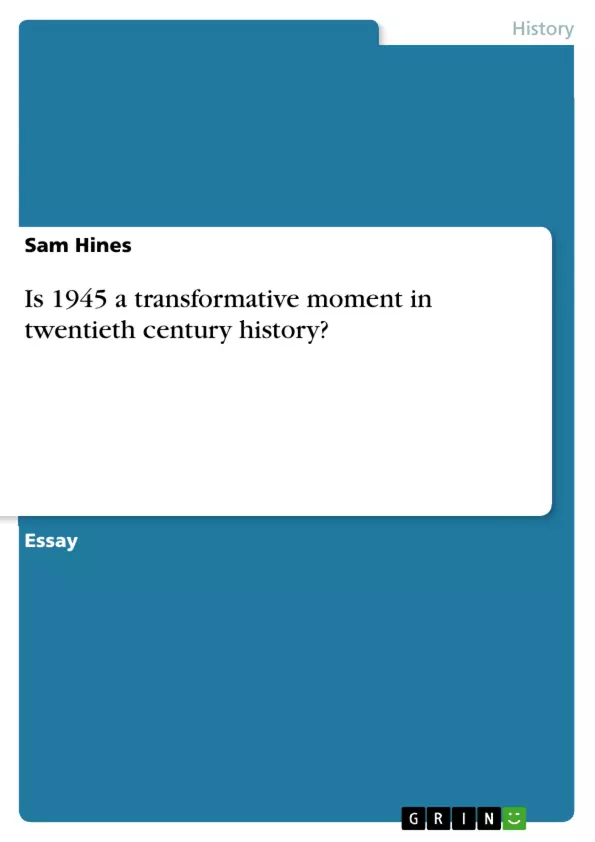This essay will argue that, though the ‘transformative’ moments can be attributed to different dates across the globe, the period around 1945 was a fundamental turning point in transnational history, shaping the remainder of the twentieth century. With the redrawing of the world map, a newly intensified ideological polarisation, nuclear proliferation and the formation of the United Nations, the notion of ‘internationalism’ gained a new prominence. Year Zero, as it was later dubbed by the likes of Ian Buruma, revealed an entirely new world order with a particular focus on the emerging Cold War: it truly was a transformative moment in global history.
With the end of the Second World War and the seeds being sown for the Cold War, the period between 1944 and 1948 was extremely disruptive, transforming the political and cultural landscapes. In order for it to be labelled 'transformative’, however, one must first understand the events of the past. For example, as many as 60 million people were killed during the war, with the new term ‘genocide’ entering our vocabulary to deal with the mass murder of the European Jews. Though it is important to note the vast incommensurability of events across the globe, there is no doubt that the events of this period had a ubiquitous effect on the world, marking the end of a destructive period of fascist authoritarianism and the dawn of a new political polarity.
Inhaltsverzeichnis (Table of Contents)
- 1945: a transformative moment in twentieth century history?
- The Redrawing of the World Map
- The division of Germany
- The creation of Israel
- The Rise of Decolonisation
- The Rise of Communism and Capitalism
- Eastern Europe
- Western Europe
- The Americanisation of Western Europe
Zielsetzung und Themenschwerpunkte (Objectives and Key Themes)
This essay argues that the period around 1945 was a fundamental turning point in transnational history, shaping the remainder of the twentieth century. The author examines the transformative events of this period, including the redrawing of the world map, the rise of decolonisation, and the emergence of a new global order characterized by the Cold War.
- The redrawing of the world map following World War II
- The rise of decolonisation and the decline of colonial powers
- The emergence of the Cold War and the ideological division between communism and capitalism
- The global rise of communism in Eastern Europe and its impact on political systems
- The Americanisation of Western Europe and the shift in global power dynamics
Zusammenfassung der Kapitel (Chapter Summaries)
The essay begins by highlighting the profound impact of World War II on the global landscape, leading to the redrawing of the world map and the emergence of new political and ideological divisions. The author examines key events such as the division of Germany, the creation of Israel, and the rise of decolonisation. The essay then focuses on the emergence of communism and capitalism as dominant ideologies in the post-war era, exploring their impact on Eastern and Western Europe. The final section delves into the Americanisation of Western Europe and the shift in global power dynamics, concluding with the end of Eurocentrism as the dominant global power.
Schlüsselwörter (Keywords)
The key terms and concepts explored in this essay include: World War II, decolonisation, Cold War, communism, capitalism, Americanisation, Eurocentrism, transnational history, internationalism, Cold War, ideological polarisation, nuclear proliferation, United Nations, Third World, fascism, German division, Israeli-Palestinian conflict, American imperialism, Marshall Plan.
Frequently Asked Questions
Why is 1945 considered a transformative moment in history?
1945 marked the end of World War II and the beginning of a new global order characterized by the redrawing of world maps, nuclear proliferation, and the start of the Cold War.
What does the term "Year Zero" refer to?
Coined by authors like Ian Buruma, "Year Zero" describes the total collapse of the old order in 1945 and the necessity to rebuild political, cultural, and social systems from scratch.
How did 1945 influence the rise of decolonisation?
The exhaustion of European colonial powers after the war and the new international focus on self-determination led to a significant surge in independence movements across Africa and Asia.
What is meant by the "Americanisation" of Western Europe?
It refers to the shift in global power dynamics where the United States exerted significant economic (e.g., Marshall Plan) and cultural influence over Western European nations post-1945.
What role did the United Nations play in the post-war era?
The formation of the United Nations in 1945 gave new prominence to the notion of "internationalism" as a means to prevent future global conflicts through collective security.
How did the ideological polarisation change after 1945?
The world became divided into two main blocs: the capitalist West led by the USA and the communist East led by the Soviet Union, defining the Cold War era.
- Arbeit zitieren
- Sam Hines (Autor:in), 2019, Is 1945 a transformative moment in twentieth century history?, München, GRIN Verlag, https://www.grin.com/document/980109



